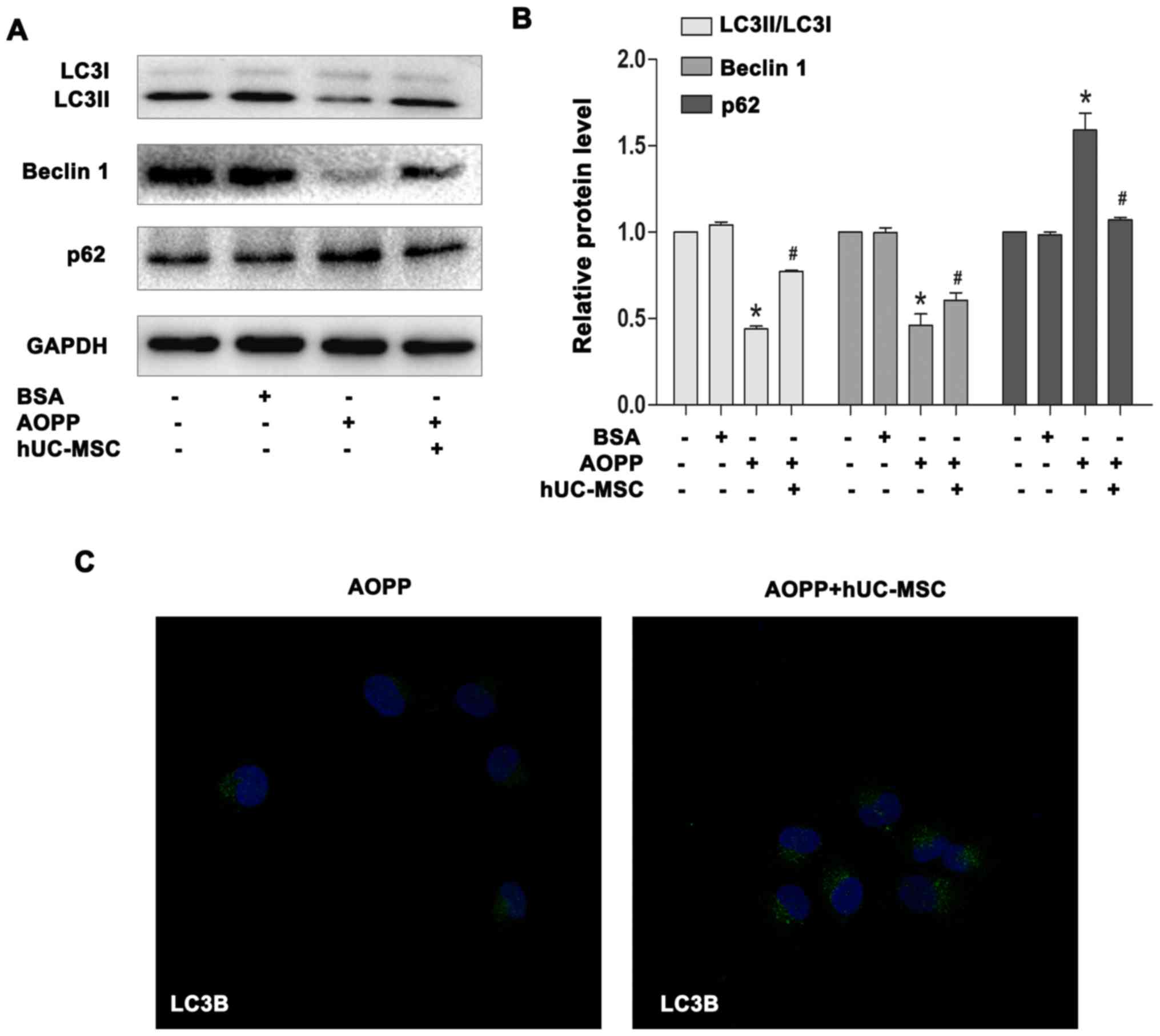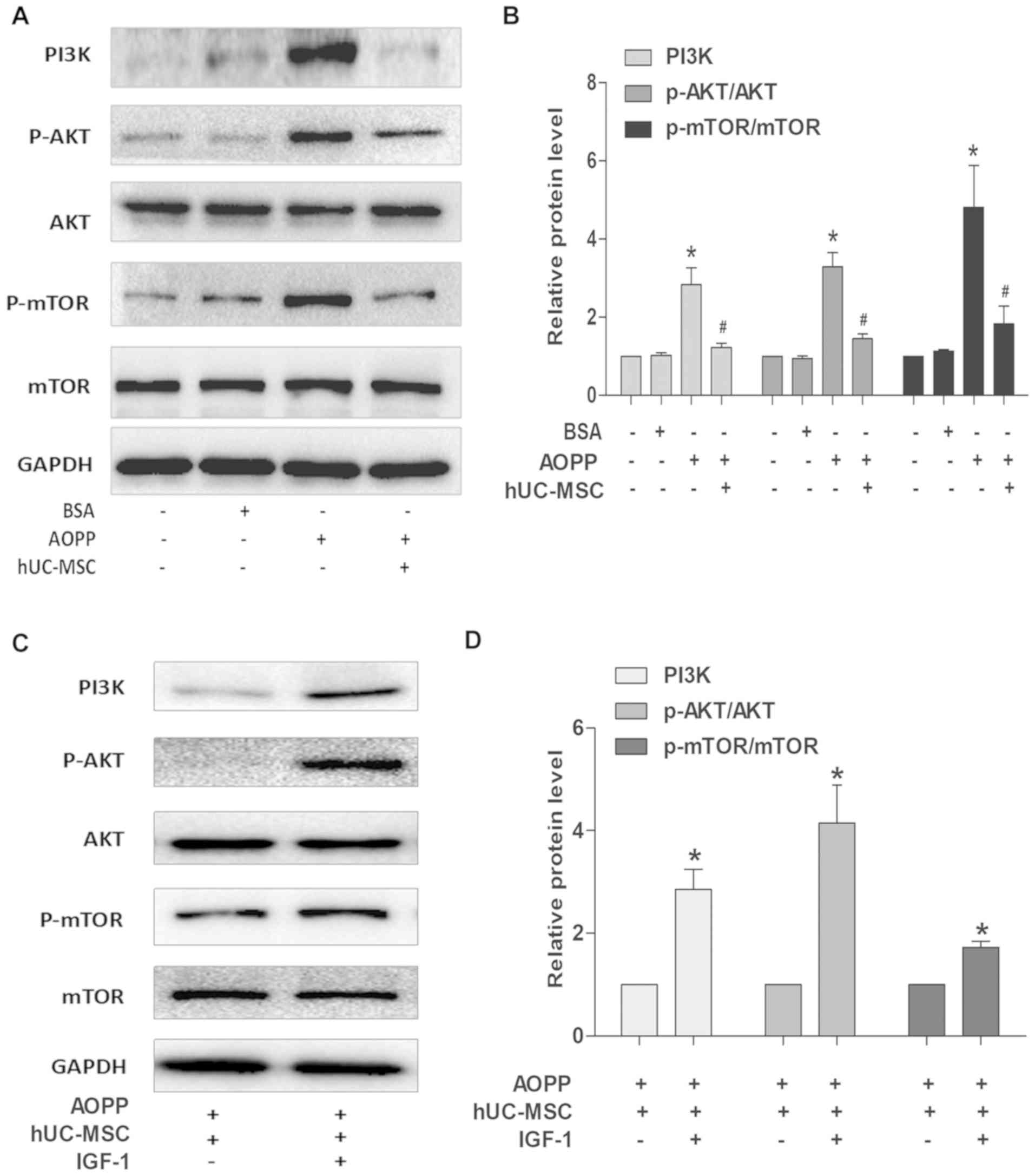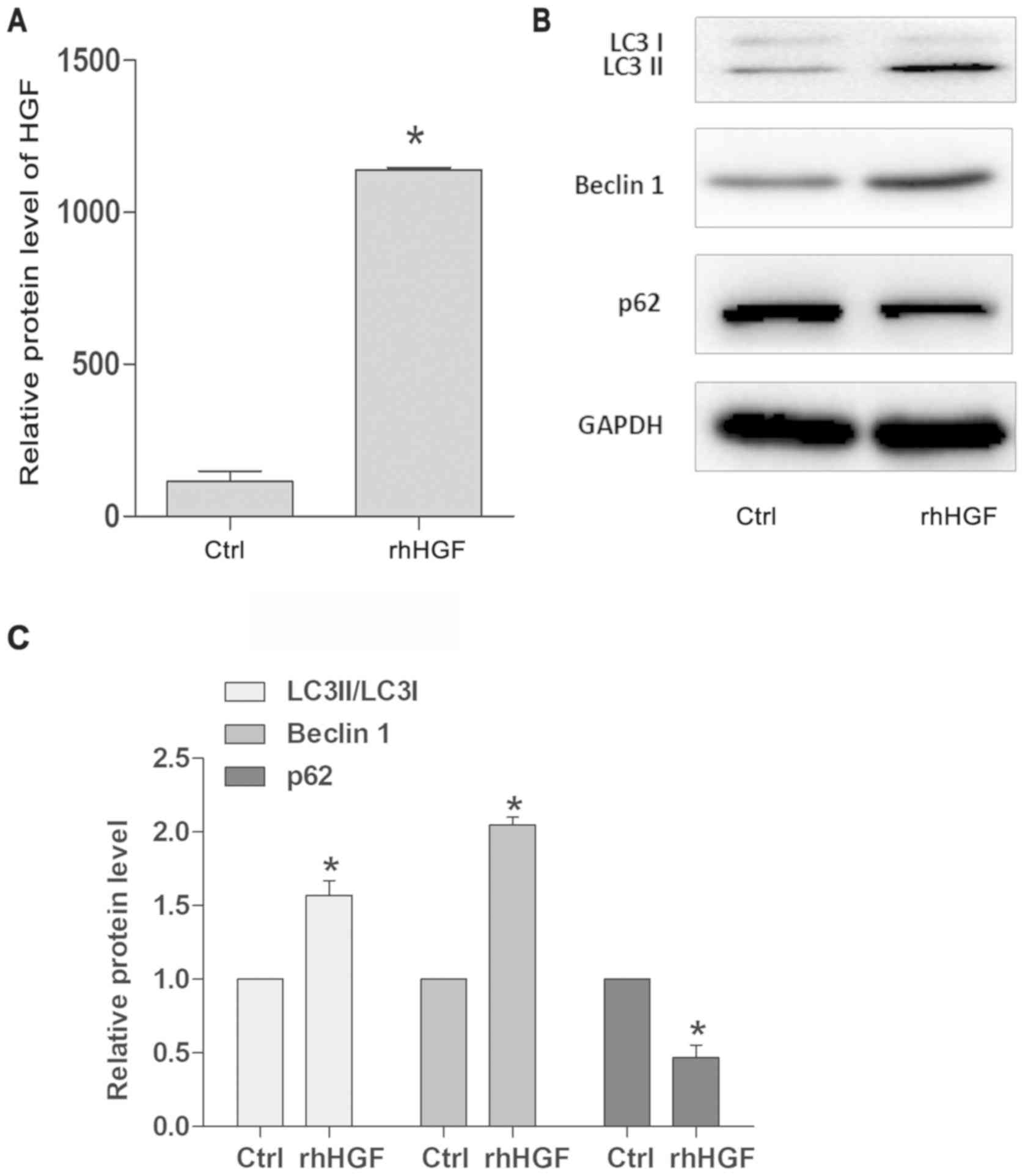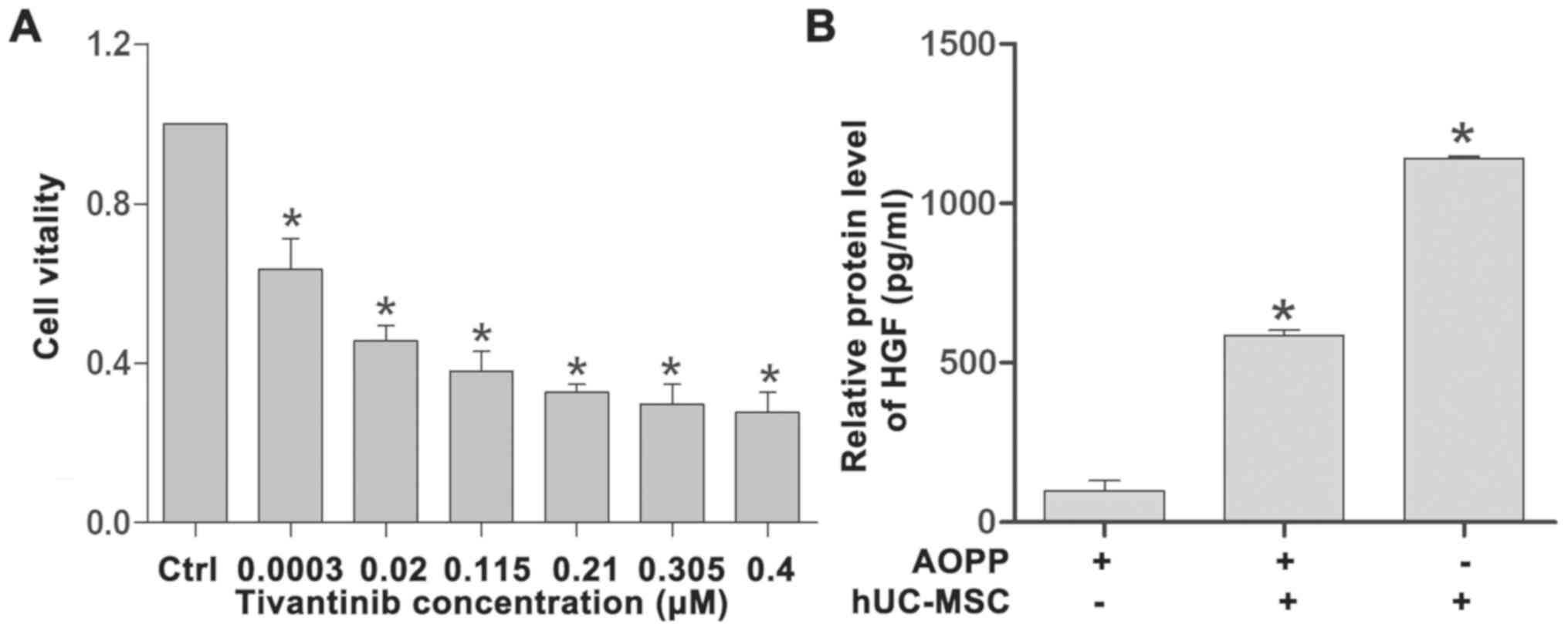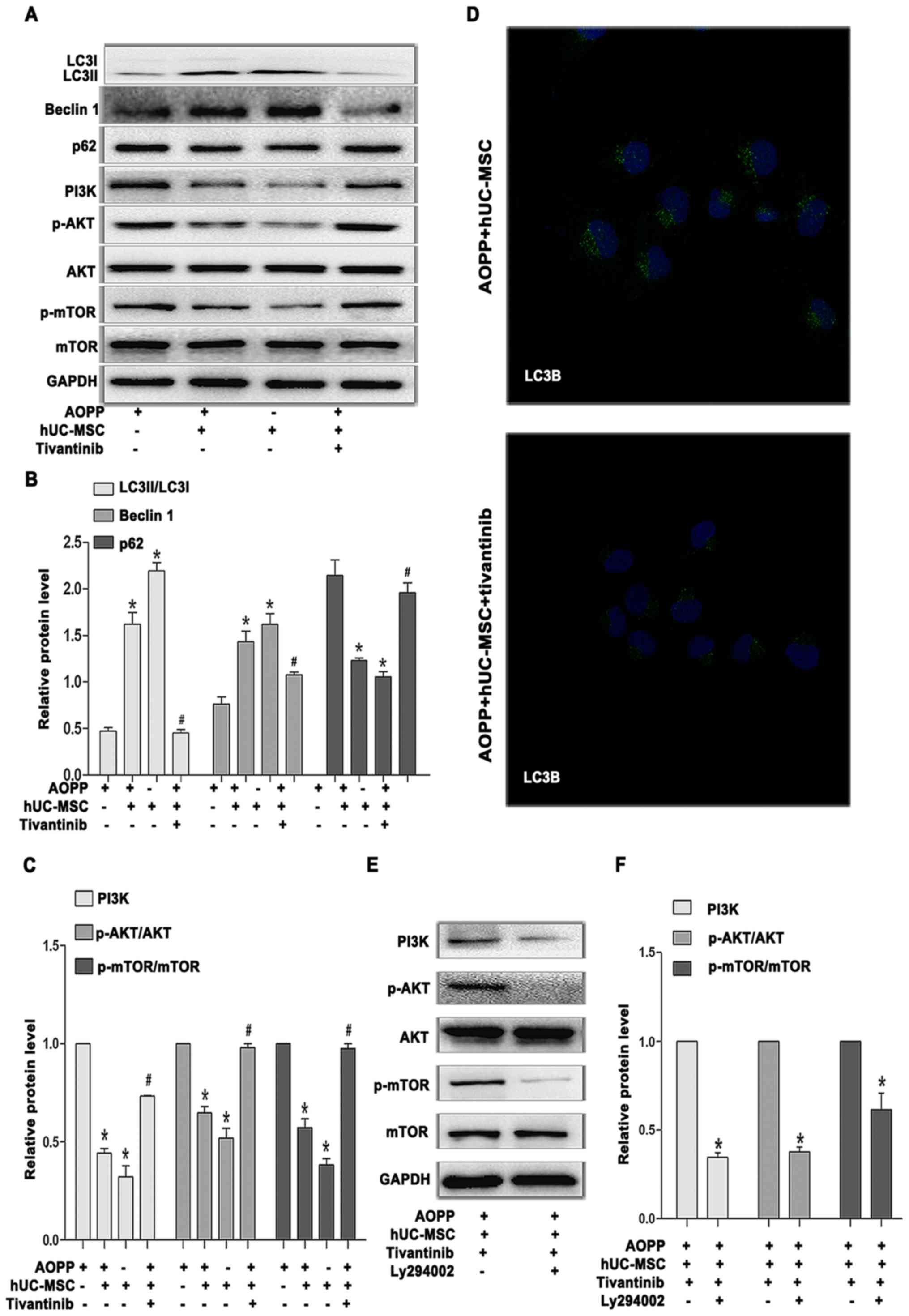|
1
|
Woo KT, Choong HL, Wong KS, Tan HB and
Chan CM: The contribution of chronic kidney disease to the global
burden of major noncommunicable diseases. Kidney Int. 81:1044–1045.
2012.PubMed/NCBI View Article : Google Scholar
|
|
2
|
Ding Y, Kim S, Lee SY, Koo JK, Wang Z and
Choi ME: Autophagy regulates TGF-β expression and suppresses kidney
fibrosis induced by unilateral ureteral obstruction. J Am Soc
Nephrol. 25:2835–2846. 2014.PubMed/NCBI View Article : Google Scholar
|
|
3
|
Nijholt DA, de Graaf TR, van Haastert ES,
Oliveira AO, Berkers CR, Zwart R, Ovaa H, Baas F, Hoozemans JJ and
Scheper W: Endoplasmic reticulum stress activates autophagy but not
the proteasome in neuronal cells: Implications for Alzheimer's
disease. Cell Death Differ. 18:1071–1081. 2011.PubMed/NCBI View Article : Google Scholar
|
|
4
|
Majmundar AJ, Wong WJ and Simon MC:
Hypoxia-inducible factors and the response to hypoxic stress. Mol
Cell. 40:294–309. 2010.PubMed/NCBI View Article : Google Scholar
|
|
5
|
Zhang J, Xiang X, Shu S, Zhang C, Liang Y,
Jiang T, Zhang W, Guo T, Liang X and Tang X: Advanced oxidation
protein products inhibit the autophagy of renal tubular epithelial
cells. Exp Ther Med. 15:3908–3916. 2018.PubMed/NCBI View Article : Google Scholar
|
|
6
|
Detamore MS: Human umbilical cord
mesenchymal stromal cells in regenerative medicine. Stem Cell Res
Ther. 4(142)2013.PubMed/NCBI View
Article : Google Scholar
|
|
7
|
Morigi M and Benigni A: Mesenchymal stem
cells and kidney repair. Nephrol Dial Transplant. 28:788–793.
2013.PubMed/NCBI View Article : Google Scholar
|
|
8
|
Shin JY, Park HJ, Kim HN, Oh SH, Bae JS,
Ha HJ and Lee PH: Mesenchymal stem cells enhance autophagy and
increase β-amyloid clearance in Alzheimer disease models.
Autophagy. 10:32–44. 2014.PubMed/NCBI View Article : Google Scholar
|
|
9
|
Amiri F, Molaei S, Bahadori M, Nasiri F,
Deyhim MR, Jalili MA, Nourani MR and Habibi Roudkenar M:
Autophagy-modulated human bone marrow-derived mesenchymal stem
cells accelerate liver restoration in mouse models of acute liver
failure. Iran Biomed J. 20:135–144. 2016.PubMed/NCBI View Article : Google Scholar
|
|
10
|
Luo D, Hu S, Tang C and Liu G: Mesenchymal
stem cells promote cell invasion and migration and
autophagy-induced epithelial-mesenchymal transition in A549 lung
adenocarcinoma cells. Cell Biochem Funct. 36:88–94. 2018.PubMed/NCBI View
Article : Google Scholar
|
|
11
|
Zhao K, Hao H, Liu J, Tong C, Cheng Y, Xie
Z, Zang L, Mu Y and Han W: Bone marrow-derived mesenchymal stem
cells ameliorate chronic high glucose-induced β-cell injury through
modulation of autophagy. Cell Death Dis. 6(e1885)2015.PubMed/NCBI View Article : Google Scholar
|
|
12
|
Ionescu L, Byrne RN, van Haaften T,
Vadivel A, Alphonse RS, Rey-Parra GJ, Weissmann G, Hall A, Eaton F
and Thébaud B: Stem cell conditioned medium improves acute lung
injury in mice: In vivo evidence for stem cell paracrine action. Am
J Physiol Lung Cell Mol Physiol. 303:L967–L977. 2012.PubMed/NCBI View Article : Google Scholar
|
|
13
|
Matsuno Y, Iwata H, Umeda Y, Takagi H,
Mori Y, Kosugi A, Matsumoto K, Nakamura T and Hirose H: Hepatocyte
growth factor gene transfer into the liver via the portal vein
using electroporation attenuates rat liver cirrhosis. Gene Ther.
10:1559–1566. 2003.PubMed/NCBI View Article : Google Scholar
|
|
14
|
Lv W, Booz GW, Wang Y, Fan F and Roman RJ:
Inflammation and renal fibrosis: Recent developments on key
signaling molecules as potential therapeutic targets. Eur J
Pharmacol. 820:65–76. 2018.PubMed/NCBI View Article : Google Scholar
|
|
15
|
Liu XS, Li JF, Wang SS, Wang YT, Zhang YZ,
Yin HL, Geng S, Gong HC, Han B and Wang YL: Human umbilical cord
mesenchymal stem cells infected with adenovirus expressing HGF
promote regeneration of damaged neuron cells in a Parkinson's
disease model. BioMed Res Int. 2014(909657)2014.PubMed/NCBI View Article : Google Scholar
|
|
16
|
Lan YW, Theng SM, Huang TT, Choo KB, Chen
CM, Kuo HP and Chong KY: Oncostatin M-preconditioned mesenchymal
stem cells alleviate bleomycin-induced pulmonary fibrosis through
paracrine effects of the hepatocyte growth factor. Stem Cells
Transl Med. 6:1006–1017. 2017.PubMed/NCBI View Article : Google Scholar
|
|
17
|
Eom YW, Oh JE, Lee JI, Baik SK, Rhee KJ,
Shin HC, Kim YM, Ahn CM, Kong JH, Kim HS, et al: The role of growth
factors in maintenance of stemness in bone marrow-derived
mesenchymal stem cells. Biochem Biophys Res Commun. 445:16–22.
2014.PubMed/NCBI View Article : Google Scholar
|
|
18
|
Bjørkøy G, Lamark T, Pankiv S, Øvervatn A,
Brech A and Johansen T: Monitoring autophagic degradation of
p62/SQSTM1. Methods Enzymol. 452:181–197. 2009.PubMed/NCBI View Article : Google Scholar
|
|
19
|
Heras-Sandoval D, Pérez-Rojas JM,
Hernández-Damián J and Pedraza-Chaverri J: The role of
PI3K/AKT/mTOR pathway in the modulation of autophagy and the
clearance of protein aggregates in neurodegeneration. Cell Signal.
26:2694–2701. 2014.PubMed/NCBI View Article : Google Scholar
|
|
20
|
Varshney P and Saini N: PI3K/AKT/mTOR
activation and autophagy inhibition plays a key role in increased
cholesterol during IL-17A mediated inflammatory response in
psoriasis. Biochim Biophys Acta Mol Basis Dis. 1864 (5 Pt
A):1795–1803. 2018.PubMed/NCBI View Article : Google Scholar
|
|
21
|
Tang X, Rong G, Bu Y, Zhang S, Zhang M,
Zhang J and Liang X: Advanced oxidation protein products induce
hypertrophy and epithelial-to-mesenchymal transition in human
proximal tubular cells through induction of endoplasmic reticulum
stress. Cell Physiol Biochem. 35:816–828. 2015.PubMed/NCBI View Article : Google Scholar
|
|
22
|
Xiang J, Jiang T, Zhang W, Xie W, Tang X
and Zhang J: Human umbilical cord-derived mesenchymal stem cells
enhanced HK-2 cell autophagy through MicroRNA-145 by inhibiting the
PI3K/AKT/mTOR signaling pathway. Exp Cell Res. 15:198–205.
2019.PubMed/NCBI View Article : Google Scholar
|
|
23
|
Rong L, Li Z, Leng X, Li H, Ma Y, Chen Y
and Song F: Salidroside induces apoptosis and protective autophagy
in human gastric cancer AGS cells through the PI3K/Akt/mTOR
pathway. Biomed Pharmacother. 122(109726)2020.PubMed/NCBI View Article : Google Scholar
|
|
24
|
Ghanaatgar-Kasbi S, Khorrami S, Avan A,
Aledavoud SA and Ferns GA: Targeting the C-MET/HGF Signaling
Pathway in Pancreatic Ductal Adenocarcinoma. Curr Pharm Des.
24:4619–4625. 2018.PubMed/NCBI View Article : Google Scholar
|
|
25
|
Park HJ, Shin JY, Kim HN, Oh SH and Lee
PH: Neuroprotective effects of mesenchymal stem cells through
autophagy modulation in a parkinsonian model. Neurobiol Aging.
35:1920–1928. 2014.PubMed/NCBI View Article : Google Scholar
|
|
26
|
Li Y, Liu J, Liao G, Zhang J, Chen Y, Li
L, Li L, Liu F, Chen B, Guo G, et al: Early intervention with
mesenchymal stem cells prevents nephropathy in diabetic rats by
ameliorating the inflammatory microenvironment. Int J Mol Med.
41:2629–2639. 2018.PubMed/NCBI View Article : Google Scholar
|
|
27
|
Tang M, Zhang K, Li Y, He QH, Li GQ, Zheng
QY and Zhang KQ: Mesenchymal stem cells alleviate acute kidney
injury by down-regulating C5a/C5aR pathway activation. Int Urol
Nephrol. 50:1545–1553. 2018.PubMed/NCBI View Article : Google Scholar
|
|
28
|
Liu H, Sun X, Gong X and Wang G: Human
umbilical cord mesenchymal stem cells derived exosomes exert
antiapoptosis effect via activating PI3K/Akt/mTOR pathway on H9C2
cells. Cell Biochem. 120:14455–14464. 2019.PubMed/NCBI View Article : Google Scholar
|
|
29
|
Zhu GQ, Jeon SH, Bae WJ, Choi SW, Jeong
HC, Kim KS, Kim SJ, Cho HJ, Ha US, Hong SH, et al: Efficient
promotion of autophagy and angiogenesis using mesenchymal stem cell
therapy enhanced by the low-energy shock waves in the treatment of
erectile dysfunction. Stem Cells Int. 2018(1302672)2018.PubMed/NCBI View Article : Google Scholar
|
|
30
|
Khubutiya MS, Vagabov AV, Temnov AA and
Sklifas AN: Paracrine mechanisms of proliferative, anti-apoptotic
and anti-inflammatory effects of mesenchymal stromal cells in
models of acute organ injury. Cytotherapy. 16:579–585.
2014.PubMed/NCBI View Article : Google Scholar
|
|
31
|
Kennelly H, Mahon BP and English K: Human
mesenchymal stromal cells exert HGF dependent cytoprotective
effects in a human relevant pre-clinical model of COPD. Sci Rep.
6(38207)2016.PubMed/NCBI View Article : Google Scholar
|
|
32
|
Chang PY, Zhang BY, Cui S, Qu C, Shao LH,
Xu TK, Qu YQ, Dong LH and Wang J: MSC-derived cytokines repair
radiation-induced intra-villi microvascular injury. Oncotarget.
8:87821–87836. 2017.PubMed/NCBI View Article : Google Scholar
|
|
33
|
Mira A, Morello V, Céspedes MV, Perera T,
Comoglio PM, Mangues R and Michieli P: Stroma-derived HGF drives
metabolic adaptation of colorectal cancer to angiogenesis
inhibitors. Oncotarget. 8:38193–38213. 2017.PubMed/NCBI View Article : Google Scholar
|
|
34
|
Zhao L, Liu X, Zhang Y, Liang X, Ding Y,
Xu Y, Fang Z and Zhang F: Enhanced cell survival and paracrine
effects of mesenchymal stem cells overexpressing hepatocyte growth
factor promote cardioprotection in myocardial infarction. Exp Cell
Res. 344:30–39. 2016.PubMed/NCBI View Article : Google Scholar
|
|
35
|
Casiraghi F, Perico N, Cortinovis M and
Remuzzi G: Mesenchymal stromal cells in renal transplantation:
Opportunities and challenges. Nat Rev Nephrol. 12:241–253.
2016.PubMed/NCBI View Article : Google Scholar
|
|
36
|
Morigi M and De Coppi P: Cell therapy for
kidney injury: Different options and mechanisms - mesenchymal and
amniotic fluid stem cells. Nephron, Exp Nephrol. 126:59–63.
2014.PubMed/NCBI View Article : Google Scholar
|
|
37
|
Lee EJ, Hwang I, Lee JY, Park JN, Kim KC,
Kim GH, Kang CM, Kim I, Lee SY and Kim HS: Hepatocyte growth factor
improves the therapeutic efficacy of human bone marrow mesenchymal
stem cells via RAD51. Mol Ther. 26:845–859. 2018.PubMed/NCBI View Article : Google Scholar
|















